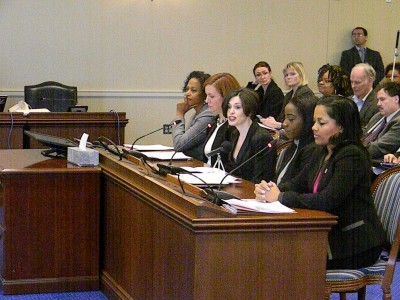ANNAPOLIS, Maryland — In the first book of “A Series of Unfortunate Events,” Count Olaf perpetrates a dastardly plan to gain control of the Baudelaire fortune by forcing orphaned 14-year-old Violet to marry him. Surrounding adults furiously condemn him but learn that he is well-insulated by arcane laws: Violet is underage, but Olaf, as her legal guardian, has the power to authorize her marriage.
This is the plot of a gothic fantasy novel; but Olaf’s scheme could likely work in Maryland and many other U.S. states.
Minors can get married in Maryland if they have their parents’ consent or the woman to be married is pregnant or has given birth. The problem, advocates say, is that parents coerce children, usually girls, into forced marriages.
In the worst cases, these marriages can be used to cover up sexual assaults or incidents of statutory rape. While people can be convicted of raping their spouses, they cannot be convicted of statutory rape of a spouse in the state.
In practice, these provisions give adults with power over a child in Maryland several tools to enforce child marriages. The power to consent to marriage gives parents the power to marry away their child, and the statutory rape exemption protects the prospective spouse from any charges not brought by the child.
A bill that would ban marriage involving people younger than 18 in all circumstances cleared a major hurdle in the House of Delegates Friday and is set to receive a final vote.
The bill’s chief sponsor, Delegate Vanessa Atterbeary, D-Howard, told the University of Maryland’s Capital News Service that many people think of forced child marriage as a foreign problem, and ” don’t think of it happening here.” She said that it affects thousands of children in the U.S. every year.
The Tahirih Justice Center, a nonprofit focused on gender-based violence that supports the bill, estimates that at least 3,200 minors were married in Maryland between 2000 and 2015, of which an estimated 85 percent were girls.
The Maryland Catholic Conference supports the bill because officials believe it is a means to increase the success rate of marriages.
In testimony submitted while the bill was in committee, the conference said that the “enterprise of marriage, as the Catholic Church understands it, cannot be accomplished by one who is lacking in maturity.”
Specifically, the conference wants to minimize marriage annulments, most of which it says arise from “lack of discretion of judgment when the couple attempted to marry.”
On the House floor on Friday, the bill provoked massive a substantial and emotional debate among delegates that cut across party lines. The battle lines generally fall between lawmakers who feel the bill would needlessly restrict the right of young people to marry, and those who see that restriction as a necessary cost of stopping forced marriage.
An amendment was proposed that would have essentially removed the power of parents to authorize marriages involving children younger than 16, but still allow 16- to 18-year-olds the right to marry under certain circumstances.
Lawmakers opposed to the overall bill or in support of the amendment offered impassioned anecdotes of successful marriages, their own and others, that took place when one or both of the participants were under 18. Several lawmakers brought up the issue of people under 18 needing to marry if they or their spouse enlist in the military to ensure that they are not split up by a deployment or base assignment.
Supporters of the bill cited examples of young marriages gone wrong, personal stories of their teenage romances that they say would have become disastrous marriages, and the harrowing tales of underage children forced into marriage by their parents.
The amendment failed with 64 in support and 72 against, an unusually close vote that scrambled party lines in a chamber where Democrats have a supermajority. A later effort to return the bill to committee was quickly defeated by a wider margin.
Atterbeary first submitted the bill in 2016; that bill passed the House of Delegates but died in the Senate’s Judicial Proceedings committee. She resubmitted the bill this year. The bill has now moved to third reader and awaits a final vote in the House. It will then move to the Senate and would again require a vote through that chamber’s committee in order to advance for a floor vote there.
Supporters cited testimony provided by a woman who testified in support of the bill in committee. The woman said she was a victim of a forced child marriage that was legal under Maryland’s marriage law.
She recounted how, at 16, she was taken to a courthouse in Elkton, Maryland, where her mother and a clerk authorized her marriage to a man twice her age. She said she cried as the paperwork was signed and a clerk told her to “cheer up.” She said she has often wondered why no one at the courthouse intervened but that, even if someone had asked her if she wanted to be married, she “would have lied and said yes, because I was too afraid of what would await me back home if I refused.”

